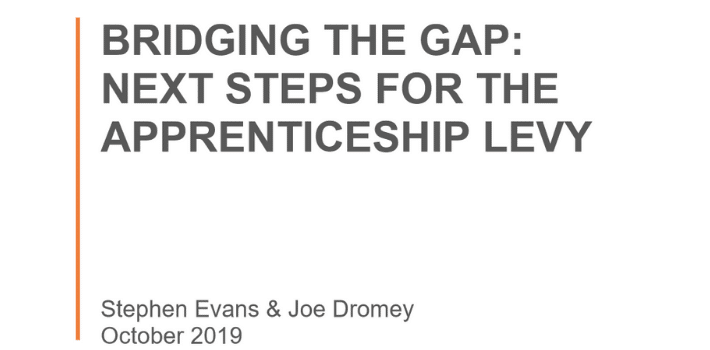
by Oscar Venus | Nov 19, 2019 | Main News Feed
Views are being sought on the structure of apprenticeship frameworks.

by Oscar Venus | Nov 19, 2019 | Main News Feed
Since the Government reforms introduced in April 2017, many members have been left in a web of confusion and at times possible frustration for multiple reasons in attempts to get their workforce invigorated and enriched by new entrant apprentices. FIS has been monitoring, absorbing and managing members through this web.
Last week a highly critical report Bridging the Gap: next steps for the apprenticeship levy from the Learning and Work Institute was released. This 19-page document cannot be considered bedtime reading, but what it does provides are some big impact statements since the 2017 reforms and brings several critical issues to the forefront:
- The number of apprenticeships starts has fallen by around 20% since these reforms, with a particularly large decline in the number of level 2 apprenticeships and rises in higher level.
- What is clear is that apprenticeships look much different now, with growth in higher and degree-level apprenticeships which tend to cost more. Many apprenticeship standards cost more than frameworks, largely because they involve a longer period of training and robust end point assessment.
- The cold hard truth – the result is the failings of the 2017 apprenticeship reform means the government is on course to miss its own target of three million apprenticeships by 2020 and bust the budget.
For some, the executive summary will provide the headlines you need. But you can review the full report here. https://www.learningandwork.org.uk/wp-content/uploads/2019/10/Apprenticeship-Levy_FinalReport.pdf
Whether an apprentice levy payer or not, these reforms have impacted your business and our sector greatly. If you need our help to assist you with apprenticeship onboarding or to understand the FIS skills responsive actions on your behalf, please contact skills@thefis.org
BRIDGING THE GAP: NEXT STEPS FOR THE APPRENTICESHIP LEVY
Authors – Stephen Evans and Joe Dromey October 2019. (Learning and Work Institute.)
Learning and Work Institute is an independent policy, research and development organisation dedicated to lifelong learning, full employment and inclusion

by Oscar Venus | Nov 19, 2019 | Main News Feed
FIS is delighted to announce the appointment of George Swann as Skills and Training lead for the organisation. George will pick up the exciting training portfolio of FIS and help to drive the organisation’s focus on competence through the FIS For Competency’s SAKE Framework. He will take up the post in January 2020.
George has been employed in training and training development since 1979. He served 22 years in the Corps of the Royal Engineers, the construction arm of the British Army. During his service he worked on various construction sites around the globe including civil engineering projects for road building, dam, bridge, pier, wharf and harbour construction, firing range demolition, repair and construction and in general building work of troop shelters, security posts, sports and recreational facilities (changing rooms, cafes and bars). He completed his service after a three-year post employed as a Training Development Analyst working at the Combined Arms Training Centre in Warminster. He left the Army at the rank of Regimental Quarter Master Sargent with qualifications in Management, Health and Safety, Quality Control and Vocational Assessment.
On leaving the Army he was employed in ship building for 18 months, monitoring and tutoring apprentices and was head hunted by a crane hire company, for the development and delivery of training and qualifications.
He has worked for CITB since 2002 initially as a Plant Monitor with the Certificate of Training Achievement department, now known as Construction Plant Competence Scheme. He moved to Standards and Qualifications Operations in 2003 as a Training Developer providing information, advice and guidance on standards and qualification revision, development and delivery. The role includes the development of National Occupational Standards and qualifications derived from these standards for construction industry occupations. He is currently facilitating the review of the National Occupational Standards for Demolition, Construction Operations and Civil Engineering Services and drafting CITB Training Standards.
Iain McIlwee, FIS CEO commented, “We are delighted to welcome George to our team, he brings with him deep knowledge of the skills and qualifications landscape and a reputation for getting stuff done. As well as helping us to deliver on our existing and ambitious programme, he will be a real asset to the organisation and our members in helping to really get to grips with the changing landscape of qualifications in the four home nations and strengthening our links with and support for our network of training providers. He will also bring fresh thinking about how we work together to improve assessment, training and competency in the existing and future workforce and manage the CPD requirements that are emerging from the Grenfell Response work.”
George added “I have had opportunity to work with FIS in recent years and admired the whole approach to the development of people and the values that the organisation projects. It is certainly exciting times at FIS and for the finishes and interiors sector as we look beyond skills and get to grips with what competence is and how we develop our members’ teams across the supply chain. I am looking forward to joining the team, meeting the members and getting stuck in working within one of the UK and Northern Ireland’s leading construction trade bodies in developing this crucial workforce.”

by Oscar Venus | Nov 19, 2019 | Main News Feed
Building Mental Health (in association with the Lighthouse Club and CITB) has 16 free places available of the two-day MHFA courses being held in Bristol on 27/28 November and Birmingham on 4/5 December.
Two Day Mental Health First Aider Course overview:
Mental Health First Aiders will gain:
· An in depth understanding of mental health and the factors that can affect wellbeing
· Practical skills to spot the triggers and signs of mental health issues
· Confidence to step in, reassure and support a person in distress
· Enhanced interpersonal skills such as non-judgemental listening
· Knowledge to help someone recover their health by guiding them to further support – whether that’s self-help resources, through their employer, the NHS, or a mix
What to expect
Through a mix of group activities, presentations and discussions, each session is built around a Mental Health First Aid action plan.
We limit numbers to 16 people per course so that the instructor can keep people safe and supported while they learn.
Everyone who completes the course gets:
· A manual to refer to whenever you need it
· A workbook including a helpful toolkit to support your own mental health
· A certificate of attendance to say you are a Mental Health First Aider
If you would like to attend, simply register your interest against your preferred date and venue on the link below. Spaces will be allocated on a first come, first served basis.
For those not able to secure a free place, this two day course is eligible for £70 CITB grant.
Register now at www.buildingmentalhealth.net/mhfafree100.html
If you want to learn more about Mental Health First Aiders, there is also a specialist workshop running at the FIS Conference: Rethinking Construction
FIS also runs the #BuildersBrew campaign focussed on helping people to understand more about mental health issues

by Oscar Venus | Oct 17, 2019 | Main News Feed
Proposed changes to improve the safety of residential high-rise buildings
The Welsh Building Safety Expert Group has produced a series of recommendations for the Welsh Government to take forward to improve the safety of residential buildings in Wales.
The Expert Group’s remit was to identify the parameters for a response to the issues raised by the Hackitt Review following the Grenfell Tower fire. Broadly speaking, the Expert Group agreed with Hackitts’s view that a fundamental, systematic change is required and that reform should be taken forward in a considered and coherent manner which avoids the ‘cherry-picking’ of the easy to do at the expense of the longer-term actions that need to be taken. The report highlights where the Welsh government should prioritise future action.
The CPA has produced a summary of the recommendations.
The full report can be accessed here.

by Oscar Venus | Oct 17, 2019 | Main News Feed
The Construction Products Association’s State of Trade Survey for 2019 Q1 reveals a balance of 46% of both heavy side and light side manufacturers experienced a rise in sales during the quarter.
Growth in product manufacturers’ output is anticipated to rise further in the coming months, with 33% of heavy side firms and half of those on the light side expecting an increase in sales in Q2.
FIS members can read the full report here.






